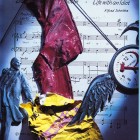Life with an Idiot 1995Scottish Opera
Read more about the opera Life with an Idiot
Scottish Opera’s 1994-5 season opened at the Edinburgh Festival with a new production of Fidelio. The Glasgow programme saw this joined by a new Maria Stuarda and a revival of Madama Butterfly. There was also a short group of performances of Tristan und Isolde, a carry-forward from the previous summer with some cast changes. At Christmas the entertainment was the final run of Iolanthe, with the New Year bringing an interesting new modern dress Marriage of Figaro. The last group of operas, in the spring, consisted of an unknown recent Russian work, Schnittke's Life With an Idiot, in a co-production with ENO, and a revival of La forza del destino along with further performances of Madama Butterfly.
One feature common to all British opera companies has been a prevalence towards work by living British composers rather than those from other countries. There have even been times when it was a rare event for any living composer to be featured.
Before they began to perform Britten's work in 1966, Scottish Opera introduced Volo di notte in its second season. The piece was twenty-five years old, but Dallapiccola was very much alive at the time. In 1970 they mounted an excellent production of Henze's Elegy for Young Lovers. Since then they had commissioned a number of new works from Scottish composers and had expanded their repertoire of Britten and Tippett. But no more living foreign composers had been represented, except for Bernstein's Candide in 1988. For that reason alone this co-production with ENO was very welcome. Schnittke was at the time a highly fashionable composer, and his work was generally interesting, though it has slipped from the repertoire since his death. Whether this piece will survive remains to be seen, though initial reactions were not generally positive.
This strange depiction of madness was taken in some quarters to be a commentary on the difficulties of life under the Soviet Union. At the time, as that institution was apparently crumbling before our eyes, it seemed to echo Orwell's 1984. The performance was excellent - the high coloratura role of the wife being particularly well done. The production seems to have been much less elaborate than the Amsterdam original, not necessarily a bad thing. As so often happens, the number of performances was small, and any further opportunity to explore the bizarre world of Schnittke was denied.


